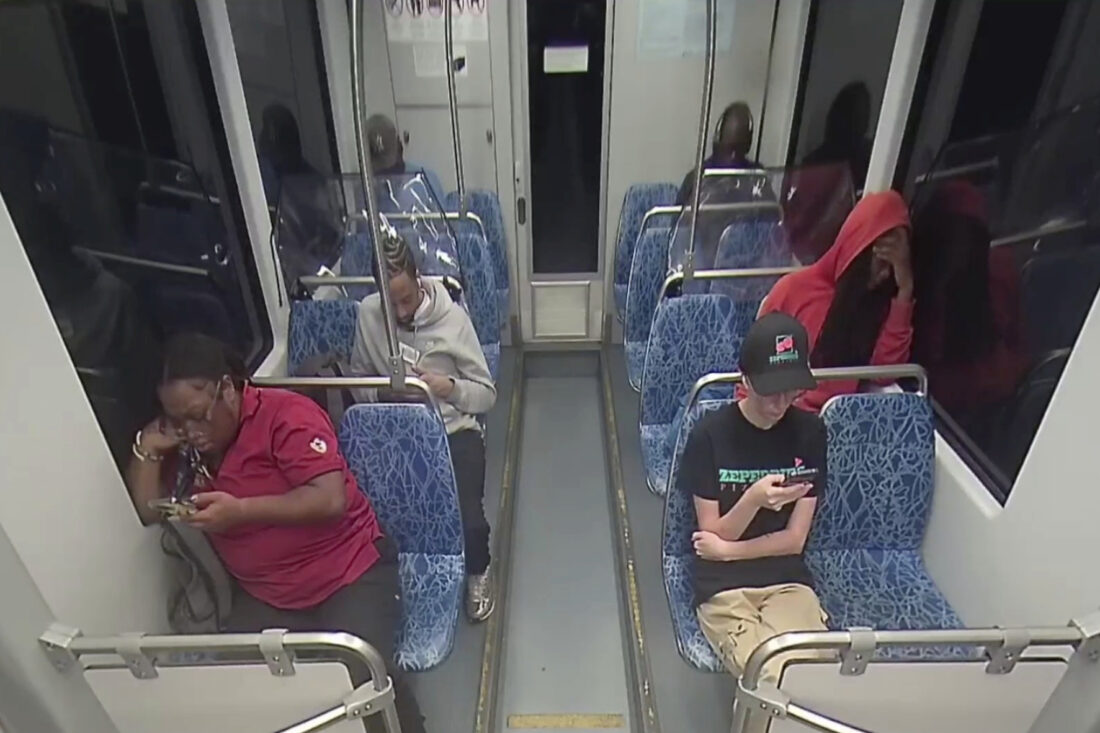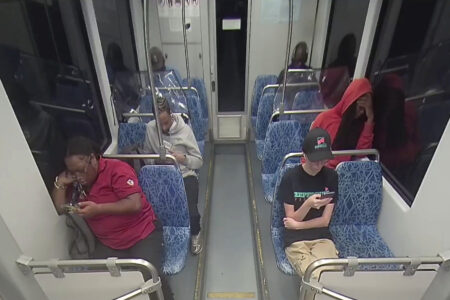Previous charges, delayed mental health evaluation were missed opportunities in Charlotte stabbing

This screengrab made from video provided by the Charlotte Area Transit System shows Iryna Zarutska, bottom right, before she was fatally stabbed on a commuter train on Aug. 22. (Charlotte Area Transit System via AP)
After Decarlos Brown Jr. was arrested for the fatal stabbing of a Ukrainian refugee aboard a North Carolina commuter train, he was quickly sent to a state mental hospital for an evaluation. It was a sharp contrast from a January misdemeanor arrest, where it took more than six months for a court to order a mental evaluation after Brown told officers that he had been given a human-made substance that controlled when he ate, talked or walked.
The Justice Department on Tuesday charged Brown, 34, with causing death on a mass transportation system last month when he allegedly killed 23-year-old Iryna Zarutska in what has become the latest flashpoint for the White House’s efforts to paint Democratic-led cities as havens for violent criminals.
The January arrest was just one of the missed opportunities in Brown’s criminal history, according to experts. He had cycled through the criminal justice system for more than a decade, court records show.
“I think there are multiple failed opportunities here, in the mental health space and in the criminal justice space,” said Kenneth Corey, a former department chief for the New York City Police Department who now teaches at the University of Chicago Crime Lab’s Policing Leadership Academy.
Court records show Brown was initially charged in 2014 with being a felon in possession of a firearm, which is sometimes used by federal prosecutors to pull cases into the federal system where there are often stiffer penalties. Federal prosecutors did not take the case, and the state charge was dropped in exchange for a guilty plea on a charge of robbery using a deadly weapon, court records show.
The Justice Department filing Tuesday was Brown’s first charge in federal court, according to a search of federal records.
Brown also is now charged with first-degree murder in state court, where records show he was sent a week after his arrest to a state mental hospital for an evaluation to determine his capacity to proceed with trial. Both the federal charge and the state charge could carry the death penalty.
Calls to the Mecklenburg County Public Defender’s Office were not answered Wednesday.
Video released Friday shows Zarutska entering a light-rail train on Aug. 22 and taking a seat in front of Brown. Minutes later, without any apparent interaction, he pulls out a pocketknife, stands and slashes her in the neck, investigators said.
The Trump administration has blamed Democrats for what they say is out-of-control crime and violence in blue cities. The White House has highlighted Brown’s case and Trump has repeatedly referred to it, saying in one social media post: “Criminals like this need to be LOCKED UP.”
In January, Brown was arrested after repeatedly calling 911 from a hospital, where he complained that someone was trying to control him with foreign substances. He was quickly released without bail on a promise to return for court, which is standard for lower-level misdemeanors. The charge carries a maximum sentence of four months in jail under standards approved by the Republican-led Legislature in 2013.
His public defender requested a mental evaluation to determine if he could contribute to his defense. A judge signed an order on July 28 telling Brown to report to a community forensic evaluator within seven days. It’s unclear if Brown went. Court records show that after the train stabbing, the evaluation order was canceled without being finished.
Brown’s mother told local television she sought an involuntary psychiatric commitment this year after he became violent at home. Doctors diagnosed him with schizophrenia.
But experts say involuntary commitments are often difficult to obtain. A court must find someone to be a danger to themself or others. Once someone is stabilized, they generally are free to leave.





